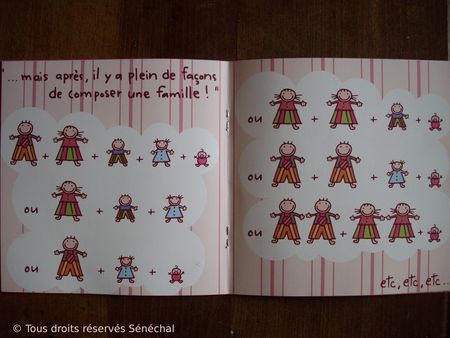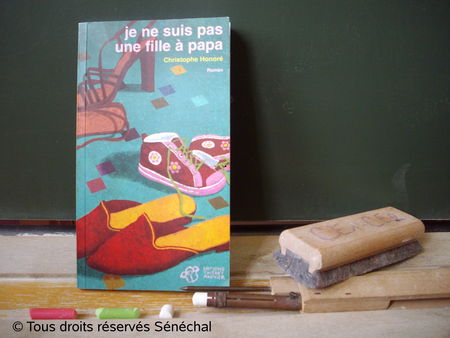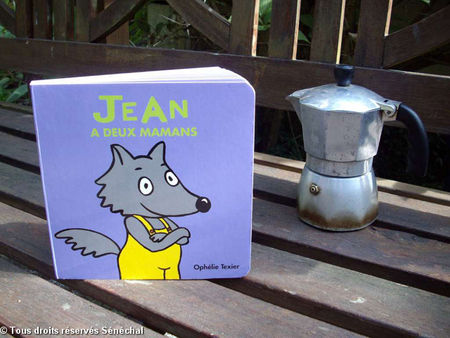Je me permets peut-être à tort de republier un entretien de Muriel Douru pour le site Homoedu datant de 2005, à des fins uniquement informatives et de mémoire personnelle :prière de faire remonter tout motif de râlerie à l'auteure de ce blog via les commentaires...
Entrevue
de Muriel Douru
2005, par homoedu
Auteure, aux Editions Gaies et Lesbiennes de deux livres pour
enfants : "Dis mamanS" (2003) et "Un mariage
vraiment gai" (2004)
 1)
Pouvez-vous vous présenter en quelques mots ? Combien de
livres avez-vous publié en littérature jeunesse /
adultes ? Quels genres (essai / roman...) ?
1)
Pouvez-vous vous présenter en quelques mots ? Combien de
livres avez-vous publié en littérature jeunesse /
adultes ? Quels genres (essai / roman...) ?
Je suis dessinatrice textile, spécialisée
dans le domaine de l’enfant. J’ai écrit deux livres pour
la jeunesse, publiés aux Editions Gaies et Lesbiennes :
"Dis mamans" (2003) et "Un mariage vraiment gai"
(2004)
 2)
Que pouvez-vous nous dire au sujet de l’homosexualité de vos
personnages et/ou " l’homophilie " de l’intrigue ?
Dans quelle mesure pensez-vous avoir écrit un livre sur
l’orientation sexuelle et l’identité de genre ou des
questions concernant les lesbiennes, gays, bisexuels, transsexuels ?
2)
Que pouvez-vous nous dire au sujet de l’homosexualité de vos
personnages et/ou " l’homophilie " de l’intrigue ?
Dans quelle mesure pensez-vous avoir écrit un livre sur
l’orientation sexuelle et l’identité de genre ou des
questions concernant les lesbiennes, gays, bisexuels, transsexuels ?
La thématique de l’homosexualité, en particulier
de l’homoparentalité, est le point de départ de mes
deux livres jeunesse. Dans "Dis mamanS", Théo, le
petit garçon de l’histoire subit les moqueries de sa copine
de classe au moment de réaliser son arbre généalogique
car il a deux mamans. Dans "Un mariage vraiment gai",
Charlotte a deux papas et quand Barnabé traite Dimitri de "PD"
dans la cour de l’école, elle va se donner pour mission de
dire la verité sur sa famille homoparentale à ses
copains de classe. Le livre aborde l’homophobie à l’école,
l’homoparentalité et aussi le PACS.
 3)
Qu’est-ce qui vous a donné envie d’écrire un livre
qui aborde - de près ou de loin - la question de l’orientation
sexuelle, les sujets gais, lesbiens, bisexuels ou transsexuels ?
3)
Qu’est-ce qui vous a donné envie d’écrire un livre
qui aborde - de près ou de loin - la question de l’orientation
sexuelle, les sujets gais, lesbiens, bisexuels ou transsexuels ?
Dans mon métier, je suis amenée à
m’intéresser aux livres pour enfants et j’étais
souvent atterrée par les clichés
véhiculés concernant la famille. Comme je me
suis par ailleurs intéressée à
l’homoparentalité, à titre personnel et parce que mes
amis devenaient parents autour de moi, je me demandais ce
que pouvais bien lire les "homoparents" à leurs
enfants, le soir avant de les coucher. C’est donc en pensant à
eux que j’ai écrit mon premier livre "Dis mamanS".
 4)
Pensez-vous que l’on puisse aborder tous les thèmes en
littérature jeunesse ? Qu’est-ce qui est selon vous
tabou ? Pensez-vous que la loi de 1949 sur la littérature
jeunesse doit être revue ou supprimée ? Pourquoi ?
4)
Pensez-vous que l’on puisse aborder tous les thèmes en
littérature jeunesse ? Qu’est-ce qui est selon vous
tabou ? Pensez-vous que la loi de 1949 sur la littérature
jeunesse doit être revue ou supprimée ? Pourquoi ?
Je ne vois pas vraiment de thèmes qu’on ne pourrait pas
aborder en littérature jeunesse à partir du moment où
il s’agit de la société qui les
entoure et dans laquelle ils vont grandir, par contre il s’agit
quand même, quand on s’adresse aux enfants, de faire passer
des messages positifs, même si le sujet est grave ou tabou. Il
y a un vraie ambition pédagogique quand on s’adresse aux
enfants.
 5)
Vous imposez-vous des limites ? Lesquelles ?
5)
Vous imposez-vous des limites ? Lesquelles ?
Je ne m’impose pas vraiment de limites par contre j’essaye
de me mettre à la place des gens qui liront mes livres
(enfants comme adultes) en n’oubliant jamais que ce qui m’est
"évident", l’homosexualité ou
l’homoparentalité par exemple, ne l’est pas forcément
pour eux. Mais ça n’est pas pour autant que je ne veux pas
parler avec simplicité de ces choses qui le sont ...
 6)
Accepteriez-vous qu’on qualifie votre livre de roman " gai " ?
ou roman " LGBT " (orienté sur les questions
lesbiennes, gays, bisexuelles, transsexuelles) ?
6)
Accepteriez-vous qu’on qualifie votre livre de roman " gai " ?
ou roman " LGBT " (orienté sur les questions
lesbiennes, gays, bisexuelles, transsexuelles) ?
Mon deuxième livre s’appelle "Un mariage vraiment
gai" et ce n’est pas pour rien ! Je n’ai aucun problème
avec le fait qu’on qualifie mes livres de
"littérature homo" sachant que c’est le but et que
je le revendique, je trouve ça juste réducteur quant à
la distribution et au lectorat qui ne se sent du coup, pas concerné.
 7)
Votre position d’auteur, est-elle militante ? vous
inscrivez-vous dans une perspective de faire évoluer les
mentalités, banaliser l’homosexualité ? Ou
plutôt préférez-vous raconter des histoires qui
vous touchent et toucheront vos lecteurs ?
7)
Votre position d’auteur, est-elle militante ? vous
inscrivez-vous dans une perspective de faire évoluer les
mentalités, banaliser l’homosexualité ? Ou
plutôt préférez-vous raconter des histoires qui
vous touchent et toucheront vos lecteurs ?
Mon désir d’écrire était d’abord
militant. Je ne me suis pas dit que j’étais un auteur et que
j’allais écrire des histoires, mais plutôt que j’avais
envie d’écrire des histoires positives sur l’homosexualité
car je n’en trouvais pas et qu’il me fallait devenir auteur pour
ça ! En ayant une démarche militante pour
faire évoluer les mentalités sur les questions
homosexuelles, j’en suis venue "naturellement" à
raconter de belles histoires. Dans les livres pour enfant, on aborde
toujours les faits de société avec légèreté
et le plus souvent, tout fini bien à la fin, je ne vois pas
pourquoi ça ne serait pas le cas concernant l’homosexualité.
Dans "Dis mamanS", l’homoparentalité est présentée
de façon naturelle et sans gravité, je voulais que
l’histoire soit racontée comme un joli conte.
 8)
À quelle classe d’âge votre livre s’adresse-t-il ?
S’adresse-t-il plutôt aux écoliers ou aux collégiens ?
8)
À quelle classe d’âge votre livre s’adresse-t-il ?
S’adresse-t-il plutôt aux écoliers ou aux collégiens ?
Mes deux livres s’adressent aux petits, donc aux écoliers.
"Dis mamanS" s’adresse même aux premières
lectures, le ton employé étant très simple.
 9)
Comment à votre avis peut-on parler d’amour en général
et d’amour homosexuel en particulier ? Est-ce délicat ?
Quelles sont les difficultés ?
9)
Comment à votre avis peut-on parler d’amour en général
et d’amour homosexuel en particulier ? Est-ce délicat ?
Quelles sont les difficultés ?
Il n’y a aucune différence entre
l’amour en général et l’amour homosexuel en
particulier, à part le regard que la société
pose sur eux qui lui, n’est pas du tout le même, légitimant
l’un et condamnant l’autre. Je n’ai pas éprouvé
de difficulté à parler de l’amour homo, plus par
contre à parler du couple, des regards amoureux ou des baisers
... des choses très simples qui peuvent choquer quand il
s’agit de de deux hommes ou deux femmes et d’autant plus quand on
s’adresse aux enfants !
 10)
Vous inspirez-vous d’autres auteurs ou de grandes figures du
panthéon LGBT ( lesbien, gay, bisexuel, transsexuel) ?
10)
Vous inspirez-vous d’autres auteurs ou de grandes figures du
panthéon LGBT ( lesbien, gay, bisexuel, transsexuel) ?
Non pas du tout. Concernant les livres pour enfants parlant
d’homosexualité, il n’y a pas vraiment de référent
littéraire, tout est à inventer.
 11)
Quelle est votre implication personnelle, la part d’autobiographie
dans votre roman ?
11)
Quelle est votre implication personnelle, la part d’autobiographie
dans votre roman ?
La part autobiographique est très importante dans mes
livres. Je parle de l’homoparentalité
parce que je m’y projette en tant que "future maman homo"
et parce que plusieurs de mes amies le sont déjà.
J’utilise des choses qu’elles me racontent mais aussi des
souvenirs personnels (comme la signature de PACS par exemple) pour
raconter mes histoires.
 12)
Quelles difficultés particulières avez-vous rencontrées
dans l’écriture de votre livre ? Comment a-t-il été
accueilli dans les milieux éditoriaux, la presse, auprès
du milieu scolaire ?
12)
Quelles difficultés particulières avez-vous rencontrées
dans l’écriture de votre livre ? Comment a-t-il été
accueilli dans les milieux éditoriaux, la presse, auprès
du milieu scolaire ?
J’ai rencontré beaucoup de
difficultés pour faire éditer mon premier livre.
Comme je voulais naïvement m’adresser au plus grand nombre je
me suis d’abord adressé aux éditeurs jeunesse
"généralistes" or ils ont tous refusé,
la plupart en me disant que la société n’était
pas prête, que ça n’intéressait personne, etc
... En m’adressant aux éditeurs homos ça n’a pas
été évident non plus. Tout ceux à qui
j’ai envoyé la maquette étaient intéressés
mais à part Anne et Marine Rambach des Editions gaies et
lesbiennes qui ont accepté le projet immédiatement, les
autres voulaient d’abord "tâter le terrain" ... Le
sujet de l’homoparentalité présentée aux
enfants est un vrai tabou.
 13)
Comment vos lecteurs ont-ils accueilli ce livre en particulier ?
Quels témoignages en avez-vous ? Lors de rencontres avec
vos jeunes lecteurs, quelles sont leurs réactions relativement
à ce livre ? Comment réagissent-ils devant la
thématique de l’orientation sexuelle, de l’homosexualité ?
Quelles sont les réactions des enseignants ?
13)
Comment vos lecteurs ont-ils accueilli ce livre en particulier ?
Quels témoignages en avez-vous ? Lors de rencontres avec
vos jeunes lecteurs, quelles sont leurs réactions relativement
à ce livre ? Comment réagissent-ils devant la
thématique de l’orientation sexuelle, de l’homosexualité ?
Quelles sont les réactions des enseignants ?
J’ai reçu un accueil très
positif des lecteurs (parents et enfants) lors de la sortie de
"Dis mamanS", j’ai été très émue
de la réaction des gens, de leurs remerciements et du regard
des enfants qui reconnaissaient le livre. J’ai
reçu des témoignages de personnes qui l’avaient
utilisé pour dire leur homosexualité à leurs
neveux, cousins, frères ou soeurs et aussi petits enfants !
Il y avait une véritable attente des "homoparents" à
tel point que les gens l’achetaient pour des enfants bien plus
grands que l’âge approprié ! Concernant le monde
scolaire, j’ai rencontré des enseignants qui voulaient
l’apporter à leur classe ou le proposer à la
bibliothèque de l’école.
 14)
Selon vous, que doit apporter aux jeunes lecteurs le fait d’aborder
une question LGBT ( lesbienne, gay, bisexuelle, transsexuelle) ?
14)
Selon vous, que doit apporter aux jeunes lecteurs le fait d’aborder
une question LGBT ( lesbienne, gay, bisexuelle, transsexuelle) ?
Il y a un désir d’apporter des "outils de tolérance"
aux jeunes lecteurs et aux adultes autour d’eux. Déclencher
le débat, les questions, faire évoluer les mentalités
sur les questions LGBT. Et de façon, plus intimiste, leur
donner un "héros" de livre qui leur ressemble en
ayant deux mamans ou papas, une tata homo, etc ...
 15)
Si l’on parle d’amour doit-on aussi parler de sexualité et
de passage à l’acte sexuel selon l’âge auquel on
s’adresse ?
15)
Si l’on parle d’amour doit-on aussi parler de sexualité et
de passage à l’acte sexuel selon l’âge auquel on
s’adresse ?
Non, je ne pense pas. Parler de l’amour a
un enfant est très facile, il le comprend très bien et
en aime le principe, même quand il s’agit de deux hommes ou
deux femmes. Les enfants sont plus instinctifs, spontanés,
le message hétérosexiste de la société ne
fait pas encore (ou toujours, en fonction de leur âge) pression
sur eux. Pour autant, leur parler de la sexualité, de ce que
font deux hommes ou deux femmes dans un lit ne me semble pas
forcément évident. Pas plus d’ailleurs que de décrire
la sexualité hétérosexuelle, sauf que dans ce
cas, elle peut expliquer leur venue au monde. Mais tout dépend
de l’âge auquel on s’adresse, on ne dira pas la même
chose à un enfant de 3 ou 10 ans.
 16)
Votre livre a-t-il été traduit ? Dans quelles
langues ? Avez-vous constaté une différence de
traitement avec les autres ? Au niveau des chiffres de vente
également ?
16)
Votre livre a-t-il été traduit ? Dans quelles
langues ? Avez-vous constaté une différence de
traitement avec les autres ? Au niveau des chiffres de vente
également ?
Il y a eu des pays étrangers intéressés par
mon premier livre mais il n’a pas été traduit pour
l’instant.
 17)
Évoquer l’orientation sexuelle, cela vous renvoie-t-il à
votre propre parcours initiatique ? à vos propres
interrogations sur les désirs et la vie ? à une
vision du monde et des relations humaines ?
17)
Évoquer l’orientation sexuelle, cela vous renvoie-t-il à
votre propre parcours initiatique ? à vos propres
interrogations sur les désirs et la vie ? à une
vision du monde et des relations humaines ?
Parler de l’homosexualité à
travers ses livres c’est accepter une visibilité immédiate
en tant qu’homo, c’est aussi devenir un peu "porte parole"
d’une cause à défendre. A ce titre c’est
déjà une façon particulière d’envisager
les relations humaines à travers le dialogue et la vie telle
qu’elle est, c’est à dire bien plus riche et variée
que ne le pense la plupart des gens ! Se
découvrir homo soulève beaucoup de questions, provoque
des conflits (avec soi, sa famille), devenir auteur de livres homos
c’est vouloir apporter son "grain de sable" aux autres
pour les soulager, les soutenir un peu. Concernant
l’homoparentalité mon envie était de dépasser
les tabous, angoisses et clichés que la société
assène à son propos pour montrer simplement que ce
sont aussi (et surtout) de belles et simples histoires de famille,
loin des polémiques mais en plein dans la vie.
 18)
Quels sont vos projets ?
18)
Quels sont vos projets ?
D’autres livres pour enfants autour des questions
d’homosexualité.
 Retour
à la sélection
HomoEdu de livres pour les jeunes sur les thèmes altersexuels.
Retour
à la sélection
HomoEdu de livres pour les jeunes sur les thèmes altersexuels.
P.-S.
Tous droits réservés à
HomoEdu.com 2000-2005
Le surlignage rouge est personnel, please don't mind.







